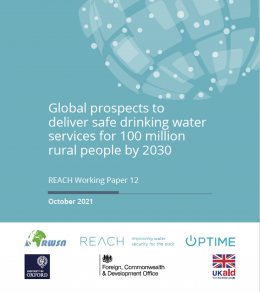RWSN Library

Author
Nilsson, K., Hope, R., McNicholl, D., Nowicki, S., and Charles, K.
Year of Publishing
2021
Publisher
University of Oxford and RWSN
Institution
REACH programme
Global prospects to deliver safe drinking water services for 100 million rural people by 2030
REACH working paper 12
Description:
The climate crisis and global pandemic have accelerated the urgency of providing safe drinking water services around the world. Global progress to safe drinking water is off-track with uncertain and limited data on the extent and performance of rural water service providers to inform policy and investment decisions. This report documents a global diagnostic survey to evaluate the status and prospects of rural water service providers from 68 countries. The service providers describe providing drinking water services to a population of around 15 million people through over 3 million waterpoints.
The data provides information on the scale and sustainability of rural water services to examine:
• The extent and type of professional water service provision in rural areas globally;
• Self-reported metrics of operational and financial performance; and,
• The size and scope of current rural service providers that could transition to results-based funding.
Five major findings emerge. First, most service providers aim to repair broken infrastructure in three days or less. Second, almost all service providers reported at least one type of water safety activity. Third, most service providers collect payments for water services. Fourth, about one third of service providers reported major negative shocks to their operations from the COVID-19 pandemic. Fifth, non-governmental service providers in low income countries less often report receiving subsidies for operations, and more often report paying part of user fees to government, including through taxes. Most rural water service providers are working towards provision of affordable, safe and reliable drinking water services. Key barriers to progress include sustainable funding and delivery of services at scale. We propose four conditions to promote scale and sustainability based on policy alignment, public finance, professional service delivery, and verifiable data. To illustrate these conditions, we consider the differing context and service delivery approaches in the Central African Republic and Bangladesh. We conclude by identifying a group of 77 service providers delivering water services for about 5 million people in 28 countries. These 77 service providers report operational metrics consistent with a results-based contracting approach. Technical assistance might support many more to progress. We argue that government support and investment is needed to rapidly progress to the scale of 100 million people to provide evidence of pathways to universal drinking water services for billions more.
Bibliographical Information:
Nilsson, K., Hope, R., McNicholl, D., Nowicki, S., and Charles, K. (2021) Global prospects to deliver safe drinking water services for 100 million rural people by 2030. REACH working paper 12 , REACH programme , University of Oxford and RWSN , Oxford, UK
More Information
DOWNLOADS (1045)
100-Million_REACH_RWSN_lowres_with-annex
 Google Übersetzer
Google Übersetzer
